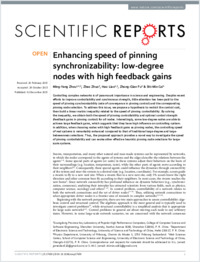Enhancing speed of pinning synchronizability: low-degree nodes with high feedback gains
- Zhou, Ming-Yang Guangdong Province Key Laboratory of Popular High Performance Computers, College of Computer Science and Software Engineering, Shenzhen University, P. R. China - Department of Electronic Science and Technology, University of Science and Technology of China, Hefei, P. R. China - Physics Department, University of Fribourg, Switzerland
- Zhuo, Zhao Department of Electronic Science and Technology, University of Science and Technology of China, Hefei, P. R. China
- Liao, Hao Physics Department, University of Fribourg, Switzerland
- Fu, Zhong-Qian Department of Electronic Science and Technology, University of Science and Technology of China, Hefei, P. R. China
- Cai, Shi-Min Web Sciences Center, School of Computer Science and Engineering, University of Electronic Science and Technology of China,Chengdu, P. R. China
-
02.12.2015
Published in:
- Scientific Reports. - 2015, vol. 5, p. 17459
English
Controlling complex networks is of paramount importance in science and engineering. Despite recent efforts to improve controllability and synchronous strength, little attention has been paid to the speed of pinning synchronizability (rate of convergence in pinning control) and the corresponding pinning node selection. To address this issue, we propose a hypothesis to restrict the control cost, then build a linear matrix inequality related to the speed of pinning controllability. By solving the inequality, we obtain both the speed of pinning controllability and optimal control strength (feedback gains in pinning control) for all nodes. Interestingly, some low-degree nodes are able to achieve large feedback gains, which suggests that they have high influence on controlling system. In addition, when choosing nodes with high feedback gains as pinning nodes, the controlling speed of real systems is remarkably enhanced compared to that of traditional large-degree and large-betweenness selections. Thus, the proposed approach provides a novel way to investigate the speed of pinning controllability and can evoke other effective heuristic pinning node selections for large-scale systems.
- Faculty
- Faculté des sciences et de médecine
- Department
- Département de Physique
- Language
-
- English
- Classification
- Physics
- License
-
License undefined
- Identifiers
-
- RERO DOC 258463
- DOI 10.1038/srep17459
- Persistent URL
- https://folia.unifr.ch/unifr/documents/304702
Statistics
Document views: 137
File downloads:
- pdf: 162
